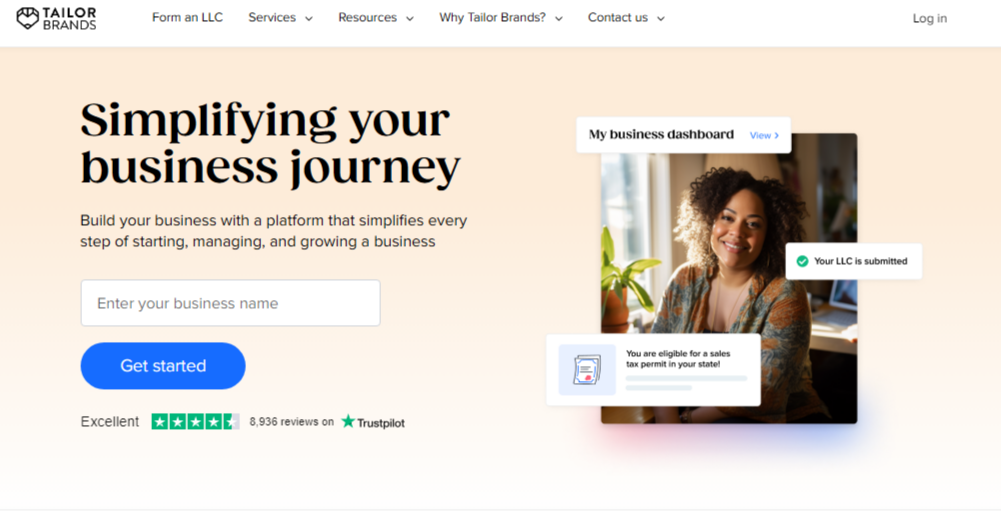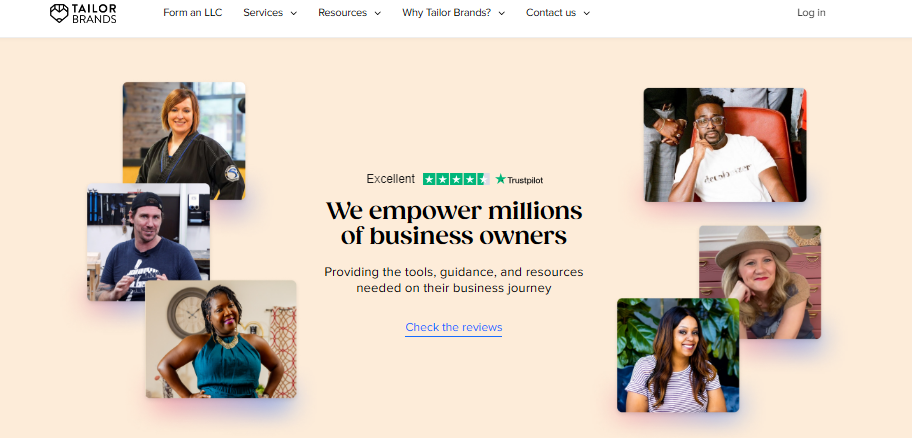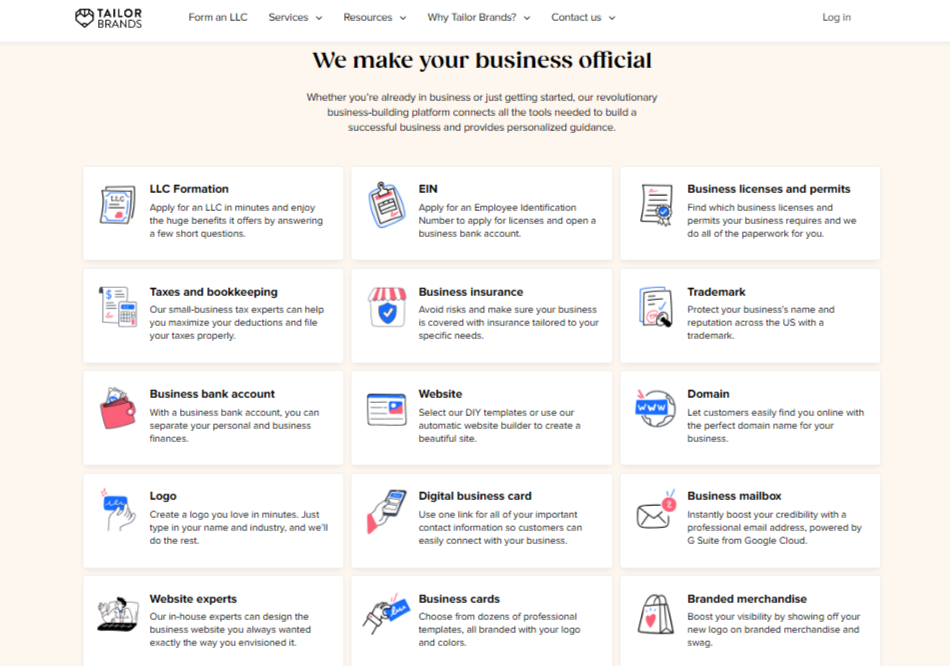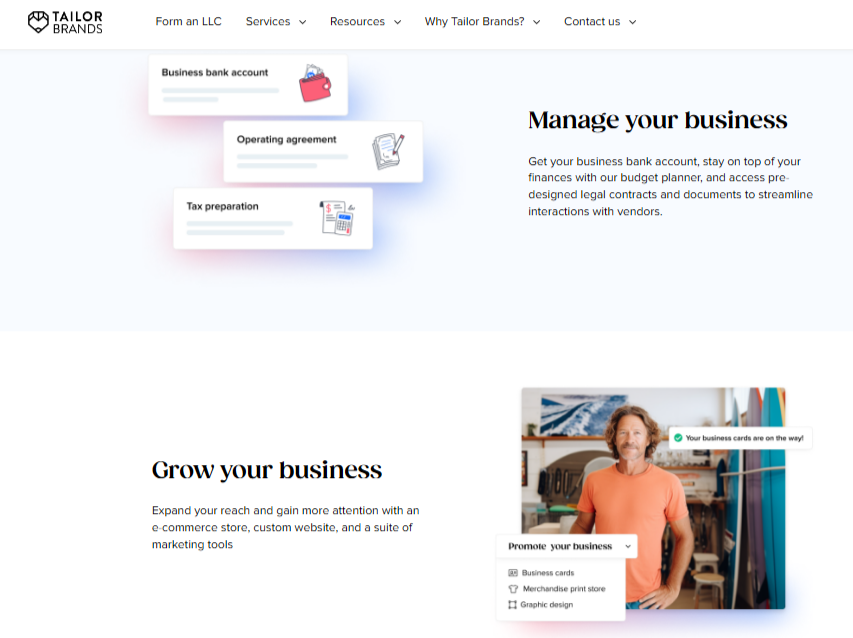GregoryBergman
Member
Digital entrepreneurs have a big choice to make in 2025. Shopify and Tailor Brands are top picks for building an online store. Each offers special features for businesses wanting a strong online presence.
We've done a detailed comparison of these two e-commerce giants. We looked at their strengths, weaknesses, and how they can change your online business. Shopify has a solid setup, while Tailor Brands brings new design tools to the table.
Choosing the right online store builder is crucial for your business. We'll cover important features, prices, and how easy it is to customize. This will help you pick the best option for your business needs.
This review aims to simplify the complex world of e-commerce. It's for startups, small businesses, and big brands wanting to grow online. Whether you want simple design or full e-commerce features, we'll show you the way.
Shopify is almost perfect with a 4.8 out of 5 rating. Tailor Brands offers great value. Our expert analysis will help you navigate the complex world of e-commerce platforms.
E-commerce trends focus on easy-to-use platforms. These tools don't need a lot of tech know-how. They have simple drag-and-drop interfaces for creating online stores that look professional.
When picking a website builder, look at design options, mobile friendliness, and how it grows with your business. Shopify and Tailor Brands are top choices. They offer tools for managing inventory, marketing, and keeping customers happy.
AI and machine learning have changed website builders a lot. They help design sites, suggest content, and track performance in real-time. This tech helps entrepreneurs make better choices and offer more personalized online experiences.
Choosing the right website builder is crucial for success. Business owners need to think about what the platform can do, how it integrates with other tools, and if it can grow with their business. This ensures the chosen solution meets their goals.
Shopify offers a full range of tools for creating strong online stores. Hosting millions of businesses daily, it has a user-friendly website builder, a vast app store, and top-notch inventory management. Its checkout process is fast, making it easy for customers to pay.
Tailor Brands excels in creating unique brand identities. It uses AI to make logos, design assets, and marketing materials. While Shopify focuses on e-commerce, Tailor Brands helps businesses stand out visually.
Both platforms make starting an online store easier. Shopify has plans for all business sizes, from basic to advanced. Tailor Brands offers creative tools for building a professional brand identity.
As online retail grows, picking the right platform is key. Knowing what Shopify and Tailor Brands offer can help entrepreneurs choose wisely. This ensures their business goals are met.

Tailor Brands shines with AI-driven branding tools. It helps startups with creative logo designs and marketing. It offers 21 logo resize options for a consistent brand look.
Shopify and Tailor Brands have different focuses. Shopify is for building online stores with lots of products. Tailor Brands is for entrepreneurs who want to focus on their brand's look.
Pricing is important when choosing a platform. Tailor Brands starts at $9.99 for full logo ownership. Shopify might cost more but offers a wide range of e-commerce tools.
Shopify is for those who want to sell a lot. Tailor Brands is for those who want to focus on their brand's look. Your choice depends on your business goals and strategy.
Shopify starts with a low entry point, offering plans from basic to enterprise. Small businesses can start with lower plans, and growing ones can move up to more advanced packages. Its pricing reflects its wide range of features, including advanced e-commerce tools and integrations.
Tailor Brands focuses on branding and design, offering more affordable options. Their plans are designed for entrepreneurs and small businesses on a budget. Users can pick plans that match their marketing and design needs.
When looking at value, consider more than just the monthly cost. Important factors include:
The best platform depends on your business's needs, growth, and budget. Both Shopify and Tailor Brands offer unique benefits for creating strong online presences.
Shopify has over 200 professionally designed themes. These templates come with powerful design tools. They help users create stunning online stores. Advanced users can customize their stores deeply with HTML and CSS.
Tailor Brands uses AI-powered design tools. It generates logo ideas quickly, creating unique brand identities in under 30 minutes. The logo maker supports many languages and offers various design options.
Both platforms focus on mobile-responsive designs. Tailor Brands also has seasonal logo generators and a "Seen Brands" feature to save all logo iterations. Their mobile app lets entrepreneurs design on the go.
Shopify's designs focus on e-commerce, while Tailor Brands helps create a unified brand identity. Users can connect their designs with social media and even print logos on business cards through Zazzle.
Whether you're a small business or a big brand, these platforms have flexible design tools. They help bring your digital vision to life.

It shines in payment gateways, giving merchants many options. Shopify's POS system ensures PCI compliance, making transactions safe. Merchants can sell easily with one-click and drag-and-drop tools.
Shipping is another strong point of Shopify. The Advanced plan costs $399 a month and offers real-time shipping rates. This helps businesses show exact shipping costs, making things clear for customers.
Tailor Brands focuses more on branding and has basic e-commerce features. Shopify's app store has many integrations, letting businesses customize their stores.
Shopify is great for fast websites, professional themes, and easy setup. Businesses can start quickly with templates, then focus on products and marketing.
Its designs are perfect for startups wanting attractive and interactive stores. Shopify's themes are designed to boost sales and engage customers.

Shopify handled 5.5 billion orders in 2023, showing it can handle lots of sales. It averages 40,000 checkouts per minute, making shopping fast and easy. Rapid scaling capabilities let businesses grow without hitting technical walls.
E-commerce security is key, and Shopify meets the highest standards. It's Level 1 PCI DSS compliant, ensuring safe payments. It also supports many payment methods, giving customers choices while keeping their data safe.
Shopify's ecosystem is vast, with thousands of apps to enhance stores. Its APIs make it easy to customize and integrate, helping brands create flexible online stores.
Real examples show Shopify's success. Arhaus, a furniture store, moved to Shopify for better growth and features. Sunology also grew fast, expanding into three European markets in just a month.
Shopify offers 24/7 support and adds over 150 new features each year. It's dedicated to helping businesses succeed in the digital world.

Social media tools are vital in today's marketing. Shopify works well with many social media platforms. This lets users manage their marketing campaigns from one place. It also has email marketing tools like Shopify Email, free for every store.
Tailor Brands uses AI for social media marketing. It has a tool to make social media posts easy for small businesses. While its SEO features are basic, they are still useful for new brands.
Shopify has more advanced analytics and integration options. It gives users detailed insights for better business decisions. It supports many marketing channels, including email, social media, and SEO.
Both platforms have their own strengths for digital marketing. Shopify offers deep tools for a wide range of businesses. Tailor Brands focuses on simple, user-friendly solutions for small businesses and entrepreneurs.
Shopify is great for those who need a lot of e-commerce features. It has a strong setup, lots of integrations, and top-notch store management. It's perfect for businesses looking to grow big.
Small businesses and startups will find Shopify flexible and full-featured. It meets their needs well.
Tailor Brands is best for those who focus on brand identity and design. It uses AI for branding and has an easy design tool. It's great for entrepreneurs who want a strong brand and basic store features.
It offers good value and fits different budgets. This makes it a good choice for new businesses.
Your choice should match your business goals and skills. Both Shopify and Tailor Brands have great tools. But, the best one depends on your specific needs and vision for 2025.
.
.
.
.
END
We've done a detailed comparison of these two e-commerce giants. We looked at their strengths, weaknesses, and how they can change your online business. Shopify has a solid setup, while Tailor Brands brings new design tools to the table.
Choosing the right online store builder is crucial for your business. We'll cover important features, prices, and how easy it is to customize. This will help you pick the best option for your business needs.
This review aims to simplify the complex world of e-commerce. It's for startups, small businesses, and big brands wanting to grow online. Whether you want simple design or full e-commerce features, we'll show you the way.
Shopify is almost perfect with a 4.8 out of 5 rating. Tailor Brands offers great value. Our expert analysis will help you navigate the complex world of e-commerce platforms.
Understanding Online Store Builders in 2025
The world of digital storefronts has changed a lot in 2025. Now, starting an online business is easier than ever. Website builders have become key tools, making e-commerce accessible to everyone.E-commerce trends focus on easy-to-use platforms. These tools don't need a lot of tech know-how. They have simple drag-and-drop interfaces for creating online stores that look professional.
When picking a website builder, look at design options, mobile friendliness, and how it grows with your business. Shopify and Tailor Brands are top choices. They offer tools for managing inventory, marketing, and keeping customers happy.
AI and machine learning have changed website builders a lot. They help design sites, suggest content, and track performance in real-time. This tech helps entrepreneurs make better choices and offer more personalized online experiences.
Choosing the right website builder is crucial for success. Business owners need to think about what the platform can do, how it integrates with other tools, and if it can grow with their business. This ensures the chosen solution meets their goals.
Platform Overview and Core Capabilities
In today's fast-paced e-commerce world, Shopify and Tailor Brands are leading the way. They help businesses grow online. With global retail e-commerce sales expected to hit $6 billion in 2024, these tools are more important than ever.Shopify offers a full range of tools for creating strong online stores. Hosting millions of businesses daily, it has a user-friendly website builder, a vast app store, and top-notch inventory management. Its checkout process is fast, making it easy for customers to pay.
Tailor Brands excels in creating unique brand identities. It uses AI to make logos, design assets, and marketing materials. While Shopify focuses on e-commerce, Tailor Brands helps businesses stand out visually.
Both platforms make starting an online store easier. Shopify has plans for all business sizes, from basic to advanced. Tailor Brands offers creative tools for building a professional brand identity.
As online retail grows, picking the right platform is key. Knowing what Shopify and Tailor Brands offer can help entrepreneurs choose wisely. This ensures their business goals are met.

Shopify vs Tailor Brands: Head-to-Head Comparison
Shopify and Tailor Brands have different strengths for online entrepreneurs. Shopify is great for e-commerce, offering tools for digital stores. It has strong inventory management, secure payments, and easy shipping.Tailor Brands shines with AI-driven branding tools. It helps startups with creative logo designs and marketing. It offers 21 logo resize options for a consistent brand look.
Shopify and Tailor Brands have different focuses. Shopify is for building online stores with lots of products. Tailor Brands is for entrepreneurs who want to focus on their brand's look.
Pricing is important when choosing a platform. Tailor Brands starts at $9.99 for full logo ownership. Shopify might cost more but offers a wide range of e-commerce tools.
Shopify is for those who want to sell a lot. Tailor Brands is for those who want to focus on their brand's look. Your choice depends on your business goals and strategy.
Pricing Structure and Value Proposition
Finding the right e-commerce pricing plan can be tricky. It's key to understand the costs of different platforms to get the best value. Shopify and Tailor Brands have different pricing plans to fit various business needs.Shopify starts with a low entry point, offering plans from basic to enterprise. Small businesses can start with lower plans, and growing ones can move up to more advanced packages. Its pricing reflects its wide range of features, including advanced e-commerce tools and integrations.
Tailor Brands focuses on branding and design, offering more affordable options. Their plans are designed for entrepreneurs and small businesses on a budget. Users can pick plans that match their marketing and design needs.
When looking at value, consider more than just the monthly cost. Important factors include:
- Total features available
- Potential transaction fees
- Integration capabilities
- Scalability of the platform
The best platform depends on your business's needs, growth, and budget. Both Shopify and Tailor Brands offer unique benefits for creating strong online presences.
Design and Customization Capabilities
Online store builders rely heavily on website templates for a strong digital presence. Shopify and Tailor Brands have unique ways to customize your brand. They meet different business needs.Shopify has over 200 professionally designed themes. These templates come with powerful design tools. They help users create stunning online stores. Advanced users can customize their stores deeply with HTML and CSS.
Tailor Brands uses AI-powered design tools. It generates logo ideas quickly, creating unique brand identities in under 30 minutes. The logo maker supports many languages and offers various design options.
Both platforms focus on mobile-responsive designs. Tailor Brands also has seasonal logo generators and a "Seen Brands" feature to save all logo iterations. Their mobile app lets entrepreneurs design on the go.
Shopify's designs focus on e-commerce, while Tailor Brands helps create a unified brand identity. Users can connect their designs with social media and even print logos on business cards through Zazzle.
Whether you're a small business or a big brand, these platforms have flexible design tools. They help bring your digital vision to life.

E-commerce Features and Integration Options
Shopify is a top choice for online stores, making up 21% of the market. It offers powerful tools for entrepreneurs to manage their digital shops well.It shines in payment gateways, giving merchants many options. Shopify's POS system ensures PCI compliance, making transactions safe. Merchants can sell easily with one-click and drag-and-drop tools.
Shipping is another strong point of Shopify. The Advanced plan costs $399 a month and offers real-time shipping rates. This helps businesses show exact shipping costs, making things clear for customers.
Tailor Brands focuses more on branding and has basic e-commerce features. Shopify's app store has many integrations, letting businesses customize their stores.
Shopify is great for fast websites, professional themes, and easy setup. Businesses can start quickly with templates, then focus on products and marketing.
Its designs are perfect for startups wanting attractive and interactive stores. Shopify's themes are designed to boost sales and engage customers.

Performance, Security, and Scalability
Businesses need strong online platforms that focus on performance, security, and growth. Shopify is a top choice that excels in these areas.Shopify handled 5.5 billion orders in 2023, showing it can handle lots of sales. It averages 40,000 checkouts per minute, making shopping fast and easy. Rapid scaling capabilities let businesses grow without hitting technical walls.
E-commerce security is key, and Shopify meets the highest standards. It's Level 1 PCI DSS compliant, ensuring safe payments. It also supports many payment methods, giving customers choices while keeping their data safe.
Shopify's ecosystem is vast, with thousands of apps to enhance stores. Its APIs make it easy to customize and integrate, helping brands create flexible online stores.
Real examples show Shopify's success. Arhaus, a furniture store, moved to Shopify for better growth and features. Sunology also grew fast, expanding into three European markets in just a month.
Shopify offers 24/7 support and adds over 150 new features each year. It's dedicated to helping businesses succeed in the digital world.

Marketing Tools and SEO Capabilities
Digital marketing is key for online businesses, and Shopify and Tailor Brands get it. Shopify has a wide range of marketing tools to help entrepreneurs reach their audience. It focuses on SEO optimization to boost online presence.Social media tools are vital in today's marketing. Shopify works well with many social media platforms. This lets users manage their marketing campaigns from one place. It also has email marketing tools like Shopify Email, free for every store.
Tailor Brands uses AI for social media marketing. It has a tool to make social media posts easy for small businesses. While its SEO features are basic, they are still useful for new brands.
Shopify has more advanced analytics and integration options. It gives users detailed insights for better business decisions. It supports many marketing channels, including email, social media, and SEO.
Both platforms have their own strengths for digital marketing. Shopify offers deep tools for a wide range of businesses. Tailor Brands focuses on simple, user-friendly solutions for small businesses and entrepreneurs.
Conclusion
Choosing the right online business tools is crucial. Shopify and Tailor Brands offer different paths for digital success. Each has strengths for various business needs.Shopify is great for those who need a lot of e-commerce features. It has a strong setup, lots of integrations, and top-notch store management. It's perfect for businesses looking to grow big.
Small businesses and startups will find Shopify flexible and full-featured. It meets their needs well.
Tailor Brands is best for those who focus on brand identity and design. It uses AI for branding and has an easy design tool. It's great for entrepreneurs who want a strong brand and basic store features.
It offers good value and fits different budgets. This makes it a good choice for new businesses.
Your choice should match your business goals and skills. Both Shopify and Tailor Brands have great tools. But, the best one depends on your specific needs and vision for 2025.
.
.
.
.
.
END
